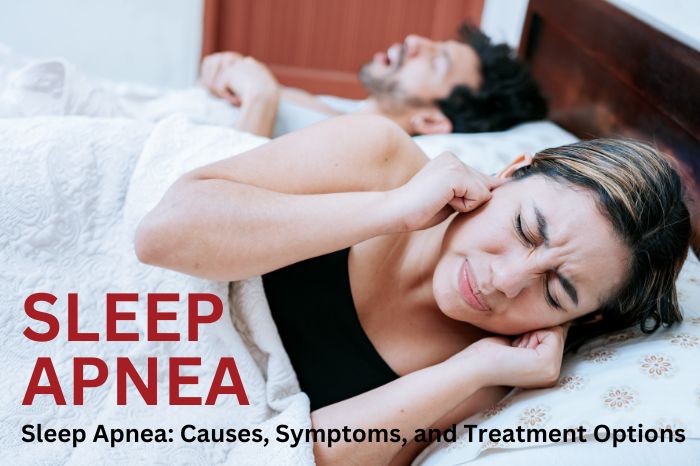Sleep apnea is a common but serious sleep disorder that affects millions of people worldwide. This condition occurs when your breathing is interrupted during sleep, which can lead to a variety of health problems if left untreated. In this article, we will explore the causes, symptoms, and treatment options for sleep apnea.
Causes of Sleep Apnea
There are two main types of sleep apnea: obstructive sleep apnea (OSA) and central sleep apnea (CSA). OSA is the most common type of sleep apnea and occurs when your airway becomes blocked during sleep. This can happen due to several factors, including:
- Excess weight: Obesity is a significant risk factor for sleep apnea because the excess fat tissue around the neck can obstruct the airway.
- Age: Sleep apnea is more common in older adults due to the natural aging process
- Family History and Genetics: Some people may inherit a narrow airway or other physical traits or your tonsils or adenoids might become enlarged and block your airway. which increases their risk of sleep apnea.
- Lifestyle factors: Smoking, excessive alcohol consumption, and sedative use can increase the risk of sleep apnea.
On the other hand, Central sleep apnea occurs because your brain doesn’t send proper signals to the muscles that control your breathing. This can happen due to various factors, including:
- Heart failure: People with heart failure are more likely to develop CSA due to the increased fluid buildup in the lungs.
- Neurological disorders: Conditions such as Parkinson’s disease and stroke can affect the brain’s ability to control breathing.
- Medications: Certain medications, such as opioids, can suppress breathing and lead to CSA.
Symptoms of Sleep Apnea
The most common symptom of sleep apnea is loud snoring followed by gasping or choking sounds. However, not everyone who snores has sleep apnea, and not everyone with sleep apnea snores. Other symptoms of sleep apnea may include:
- Daytime sleepiness: People with sleep apnea often feel excessively tired during the day, which can affect their work performance and quality of life.
- Morning headaches: Waking up with a headache is a common symptom of sleep apnea because interrupted breathing can reduce the oxygen levels in your blood.
- Irritability: Sleep apnea can affect your mood and lead to irritability, depression, and anxiety.
- High blood pressure: Sleep apnea is associated with high blood pressure because repeated breathing interruptions can increase stress on the cardiovascular system.
Treatment Options for Sleep Apnea
The treatment options for sleep apnea depend on the type and severity of the condition. For mild cases of sleep apnea, lifestyle changes such as losing weight, quitting smoking, and avoiding alcohol and sedatives can be effective. Other treatment options may include:
- Continuous positive airway pressure (CPAP): CPAP is the most common treatment for moderate to severe OSA. It involves wearing a mask over the nose and mouth that delivers a continuous stream of air to keep the airway open during sleep. If using a CPAP machine continues to be a problem for you, you might be able to use a different type of airway pressure device that automatically adjusts the pressure while you’re sleeping (auto-CPAP). Units that supply bilevel positive airway pressure (BPAP) also are available. These provide more pressure when you inhale and less when you exhale.
- Oral appliances: Oral appliances are custom-made devices that can help keep your airway open by repositioning your jaw or tongue during sleep.
- Surgery: Surgery may be an option for severe cases of sleep apnea that do not respond to other treatments. The most common surgical procedures for sleep apnea include uvulopalatopharyngoplasty (UPPP) and maxillomandibular advancement (MMA).
Signature Smilez Family Dental and Sleep Apnea
At Signature Smilez Family Dental, we offer comprehensive dental services to improve your oral health and overall well-being. Our team of dental professionals can also help diagnose and treat sleep apnea, as we understand the connection between dental health and sleep disorders. Our dentists can work with your physician to develop a personalized treatment plan for your sleep apnea, which may include oral appliances or other dental interventions.
In addition, our dental team can help you address any dental issues that may contribute to your sleep apnea, such as teeth grinding or if someone has an overbite, underbite, or crossbite, their jaw may not rest in a healthy natural position. This may contribute to TMJ pain and obstruct the airway, leading to sleep apnea. Other times, sleep apnea can lead to TMJ problems. We can also guide you on maintaining good oral hygiene habits, which can help prevent dental problems that can exacerbate sleep apnea.
If you suspect that you have sleep apnea or are experiencing symptoms such as loud snoring or daytime fatigue, it’s important to seek medical attention promptly. A sleep study can help diagnose sleep apnea, and your physician can work with our dental team to develop a comprehensive treatment plan.
Sleep apnea is a common but serious sleep disorder that can affect your overall health and quality of life. Fortunately, there are several effective treatment options available, including CPAP, oral appliances, and surgery. If you suspect that you may have sleep apnea, it’s essential to seek medical attention promptly to receive an accurate diagnosis and personalized treatment plan.
Contact us today to schedule an appointment and learn more about our services.

